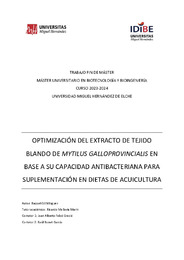Por favor, use este identificador para citar o enlazar este ítem:
https://hdl.handle.net/11000/32451Optimización del extracto de tejido blando de Mytilus Galloprovincialis en base a su capacidad antibacteriana para suplementación en dietas de acuicultura
| Título : Optimización del extracto de tejido blando de Mytilus Galloprovincialis en base a su capacidad antibacteriana para suplementación en dietas de acuicultura |
| Autor : Gil Mínguez, Raquel |
| Tutor: Mallavia, Ricardo Falcó, Alberto Bonet-García, Raul |
| Editor : Universidad Miguel Hernández de Elche |
| Departamento: Departamentos de la UMH::Biología Aplicada |
| Fecha de publicación: 2024-07 |
| URI : https://hdl.handle.net/11000/32451 |
| Resumen : La acuicultura juega un papel crucial en las perspectivas de seguridad alimentaria global al ser una alternativa a la sobreexplotación de los recursos marinos. Sin embargo, la industria enfrenta una serie de desafíos en términos de sostenibilidad. Uno de los problemas más críticos es la incidencia de enfermedades bacterianas, agravadas actualmente por el cambio climático, ya que frecuentemente conllevan un uso excesivo de antibióticos con graves impactos ambientales. Además, la gestión de los descartes, que no cumplen con los estándares comerciales, representa otro problema crítico que necesita ser abordado en esta industria. Por consiguiente, este estudio pretende extraer compuestos bioactivos del mejillón Mediterráneo (Mytilus galloprovincialis), la especie de moluscos más cultivada en España, con los objetivos de (i) seleccionar condiciones de extracción aleatorias en base a variables predefinidas aplicando el procedimiento Box-Behnken (ii) determinar la actividad antimicrobiana y antioxidante, la cantidad de proteína y el rendimiento de estas extracciones y (iii) determinar las condiciones óptimas de extracción mediante Box-Behnken priorizando la actividad antibacteriana. Para lograr estos objetivos, primero se optimizaron parámetros de extracción como el ratio (g analito/ml disolvente), la potencia de ultrasonidos (J/ml) y el tiempo de maceración (h). Para ello, se utilizó un modelo estadístico de Box-Behnken mediante una evaluación exhaustiva de varios factores que influyen en el proceso de extracción, como el contenido proteico y su capacidad antibacteriana y antioxidante. Además, se llevaron a cabo trabajos adicionales para la caracterización molecular de los extractos obtenidos como la cromatografía líquida de alta resolución acoplada a un espectrómetro de masas de triple cuadrupolo con ionización por electrospray (HPLC-ESI-QqQ-MS) y la medición de espectros de absorbancia UV-Vis. Sin embargo, la identificación precisa de los péptidos antimicrobianos posiblemente responsables de la actividad antibacteriana se vio dificultada tanto por las limitaciones técnicas asociadas a los métodos de extracción como a la complejidad de la matriz biológica del mejillón. Estos desafíos subrayan la necesidad de desarrollar estrategias avanzadas de fraccionamiento y purificación para profundizar en la comprensión de los mecanismos bioquímicos involucrados en la defensa contra patógenos de M. galloprovincialis. Por lo tanto, los resultados de esta investigación representan un estudio preliminar para futuras investigaciones con el fin de encontrar alternativas innovadoras a los antibióticos y mejorar la eficiencia y sostenibilidad de la industria acuícola. Aquaculture plays a crucial role in global food security by offering an alternative to the overfishing of marine resources. However, the industry faces several sustainability challenges. One of the most critical issues is the incidence of bacterial diseases, exacerbated by climate change, which often leads to excessive use of antibiotics with serious environmental impacts. Additionally, managing non-commercial discards is another critical issue that needs to be addressed in this industry. Therefore, this study aims to extract bioactive compounds from the Mediterranean mussel (Mytilus galloprovincialis), the most cultivated mollusk species in Spain, with the objectives of (i) selecting extraction conditions based on predefined variables using the Box-Behnken procedure, (ii) determining the antimicrobial and antioxidant activity, protein content, and yield of these extractions, and (iii) optimizing extraction conditions using Box-Behnken to prioritize antibacterial activity. To achieve these objectives, extraction parameters such as ratio (g analyte/ml solvent), ultrasonic power (J/ml), and maceration time (h) were first optimized. A Box-Behnken statistical model was used to comprehensively evaluate various factors influencing the extraction process, including protein content and its antibacterial and antioxidant capacity. Additional work was carried out for molecular characterization of the extracts using high-performance liquid chromatography coupled to a triple quadrupole mass spectrometer with electrospray ionization (HPLC-ESI-QqQ-MS) and UV-Vis absorbance spectroscopy. However, precise identification of antimicrobial peptides possibly responsible for antibacterial activity was hindered by technical limitations associated with extraction methods and the biological complexity of the mussel matrix. These challenges underscore the need to develop advanced fractionation and purification strategies to deepen the understanding of biochemical mechanisms involved in defense against pathogens in M. galloprovincialis. Therefore, the results of this research represent a preliminary study for future investigations aimed at finding innovative alternatives to antibiotics and improving the efficiency and sustainability of the aquaculture industry. |
| Palabras clave/Materias: Extracción orgánica Mytilus galloprovincialis Box-Behnken Capacidad antibacteriana Actividad antioxidante Acuicultura |
| Área de conocimiento : CDU: Ciencias puras y naturales: Biología |
| Tipo de documento : info:eu-repo/semantics/masterThesis |
| Derechos de acceso: info:eu-repo/semantics/openAccess Attribution-NonCommercial-NoDerivatives 4.0 Internacional |
| Aparece en las colecciones: TFM-M.U en Biotecnología y Bioingeniería |
 La licencia se describe como: Atribución-NonComercial-NoDerivada 4.0 Internacional.
La licencia se describe como: Atribución-NonComercial-NoDerivada 4.0 Internacional.
.png)
